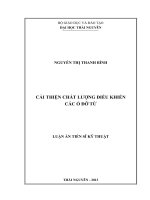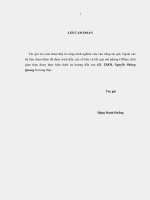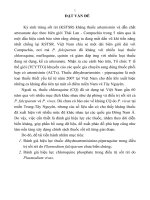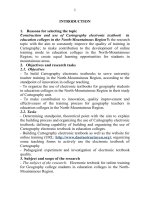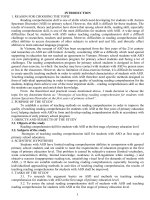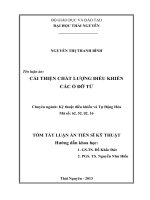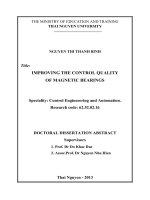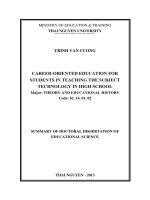cải thiện chất lượng điều khiển các ổ đỡ từ bản tóm tắt luận án tiếng anh
Bạn đang xem bản rút gọn của tài liệu. Xem và tải ngay bản đầy đủ của tài liệu tại đây (1.46 MB, 27 trang )
THE MINISTRY OF EDUCATION AND TRAINING
THAI NGUYEN UNIVERSITY
NGUYEN THI THANH BINH
Title:
IMPROVING THE CONTROL QUALITY
OF MAGNETIC BEARINGS
Speciality: Control Engineeering and Automation.
Research code: 62.52.02.16
DOCTORAL DISSERTATION ABSTRACT
Supervisors
1. Prof. Dr Do Khac Duc
2. Assoc.Prof. Dr Nguyen Nhu Hien
Thai Nguyen - 2013
Training Institution:
Thai Nguyen University of technology – Thai Nguyen University.
Supervisors
1. Prof. Dr Do Khac Duc
2. Assoc.Prof. Dr Nguyen Nhu Hien
Phản biện 1: PGS. TS. Bùi Quốc
Khánh
Phản biện 2: PGS. TS. Phạm Ngọc Tiệp
The dissertation will be defended in front of council in Univeristy
Level at:
Trường Đại học Kỹ thuật Công nghiệp Thái Nguyên - Đại học
1
DOCTORAL DISSERTATION ABSTRACT
Introduction
Overview
There is no direct contact between the stationary and moving
parts, so the magnetic bearings has important applications and
efficiency for the rotating machines with high speeds (from 5000 r/
min to 10,000 r/min), requiring great precision, working in
environments not using lubricants (temperature, pressure very high
or very low).
Currently, research is focusing on the following four directions:
1.1 Research and apply in industrial and biomedical devices.
1.2. Research to reduce the size of the magnetic bearing.
1.3. Research to work in special environments such as vacuum,
temperature, pressure very high or very low
1.4. Research to apply modern controllers. Dissertation’s content
will research following the 4
th
trend.
Motivation of topic
Unlike mechanical bearings, magnetic bearings have no contact between
the stationary and moving elements. Thus, magnetic bearings used in
electric motors are considered as an advanced and environmentally friendly
technology. They strongly contribute in raising the rotational speed to the
engine and help the engine be applied in the special environment that
common engine with ball mechanical bearing can not work or work with
very high maintainance cost. The studies about magnetic bearings typically
are in the developed countries such as Japan, America, France, Germany
and Switzerland. Currently, the applicability of electric motor using
magnetic bearings is necessary in many areas; the study of manufacturing
electric motors using magnetic bearings and applications is also being
promoted in developing countries such as China, Korea, Brazil
2
Magnetic bearings used in electric motors currently classify as the
high-tech products containing many levels of intelligence and also
the new green technology products, although there are limitations in
the use of wide available due to the large size and high cost but in the
near future when the researchers succeed in reducing the cost, the
replacement of electric motor using magnetic bearings in the field of
clean technology, medical equipment, defense equipment and
industrial space, will be inevitable.
The important part of the magnetic bearings is the controller.
Currently the controller for the magnetic bearings is low quality as
maladaptive, unsustainable, control signals are not limited. This fact is
due to the dynamics of the magnetic bearing is highly nonlinear, and the
method of designing the controller for nonlinear systems (including
magnetic bearings) under the effect of external disturbance and
containing changing parameters during operation have not been studied
and developed completely in order to the apply to design the controller
to ensure that the magnetic bearing is capable of performing well in any
mode working. So study to design the controller in order to improve the
quality of magnetic bearing is necessary.
Objects and scope of research
- Controlling radial magnetic bearing 4 DOFs, in the drive system
using synchronous electric motors, stimulating by permanent magnet
and blocking motion along axis, working with high speed.
- The research of this dissertation limits in building mathematical
description having the impact of disturbance and uncertainty
parameters to synthesize nonlinear control system under the equation
Euler - Largrange (EL) with enough structure - nonlinear channel
separation, to improve the control quality compared with classical
linear control system.
3
Research Methodology
- Based on the mechanical, electrical and magnetic laws to
calculate dynamics for a radial magnetic bearing 4 DOFs.
- The mathematical description of the radial magnetic bearings
4DOFs in the form of EL.
- Design the controller of nonlinear channel separation for the
magnetic bearings.
- Research magnetic bearing by simulation.
- Empirical study on the magnetic bearing.
The content and scope of the problem will be studied in depth,
resolution and prospects for achieving results
- Develop mathematical description of magnetic bearing 4 DOFs,
under the radial force.
- Design to control nonlinear channel separation for system under
the effects of noise and uncertainty parameter.
- Simulations and experiments on the control system in laboratory
equipment.
The theoretical and practical meaning of topics
- This is a new problem to be studied in Vietnam and is one of the
first scientific studies of the magnetic bearings announcing in Viet
Nam and is a new research direction having highly promising
application in scientific research…
- The results of the research will be the reference to students and
graduate students. From the results of the research will serve as a
basis for many subsequent studies, in order to widespread application
of the electric magnetic bearing to drive system in Vietnam,
especially in systems with special requirements (speed high, high or
low temperature, vacuum, not lubrication, ).
Layout of the dissertation
The dissertation consists of 4 chapters, 97 pages (including
references), 61 references, 64 figures and graphs.
4
Chapter 1: Overview of the magnetic bearing
1.1. The concept of the shaft and drive shaft bearing
- Presentation of the basic concepts of bearing and magnetic
bearings
- Classification of magnetic bearings and identifying the research
object is active magnetic bearings (AMB).
- Trình bày nguyên lý nâng dùng lực từ
a)
Displacement
sensor
Controller
Power amplifier
b)
Figure 1.6: a) Shape and b) the basic elements of magnetic bearing
Contro
ller
Electromagnetic actuator
Power
amplifier
Rotor
Rotor
Rotor weight mg
Magnetic force
f
m
Electromagnetics (Stator)
Sensor
Figure 1.7: Structure of AMB 1 DOF
5
1.2. Theory, research-orientation of topics
1.2.1. Overview of research in Viet Nam and in the world
1.2.2. Research in the Viet Nam
In Vietnam today only at Hanoi University of Technology and Thai
Nguyen University of Technology are now studying.
1.2.3. Research in the world
Presenting some of the results of research works from around the
world in recent years from 2003 to 2009.
1.3. Conclusion of Chapter 1
Chapter 1 has solved some problems:
- Introducing the most generalized definitions of bearing and
magnetic bearing.
- Select the type of active magnetic bearings to research.
- Orientation of research is to apply modern control methods to
control the magnetic bearings in the drive systems.
- Propose the control method PD to compensate gravity, nonlinear
channel separation based on EL description for the enough structure
system to design controller for the magnetic bearing system.
On the basis of preliminary studies on the magnetic bearing,
chapter 2 will study in depth the dynamics of magnetic bearing under
radial force to describe mathematically the drive system using
magnetic bearings 4 DOFs.
Chapter 2: The mathematical description of the active
magnetic bearing
2.1. Introduction
Principles of magnetic bearing are a electric magnet instead of
creating shaft torque, it generates displacement forces in the x and y
axis, these forces are automatically adjusted to maintain the gap
between stator and rotor around the nominal value
6
2.2. Mathematical basis of magnetic levitating system
- According to [1] magnetic levitating system was studied on the
basis of approximations based on assumptions such as: flux is closed
completely in the ferromagnetic core, not consider at the saturation
mode etc
- The calculation is based on the average length of the path of
magnetic field and the length of the air gap to the nominal value x
0
.
2.2.1. Magnetic flux density of the magnetic circuit
With these assumptions have not leakage flux, we have:
0
0 I
0
0 0 0
2
1
2
a
C C I
r r a r r
S Ni
Ni
x l l l l
x
S
(2.6)
2.2.2. Reluctance R and the inductance L of the magnetic circuit
The components of magnetomotive force, flux, relectance and the
invariable magnetic circuit are considered as components
corresponding to the voltage, current, resistance and power (DC) in
the circuit. The main difference is that reluctance is an energy
storage component rather than dissipating energy component. Source
"DC" – N
i
performs for the magnetomotive force due to the currents
on the coil generated.
2.2.3. Electromagnetic force including the magnetic saturation of
core of steel
Electromagnetic force including the magnetic saturation of core of
steel is determined [1]:
2 2 2 2
a 0 a 0 a
2 2
0
C I C I
0 0
r r r r
W 2 S N i S N i
1
F
x 2
l l l l
2x 2x
(2.16)
2.2.4. Electromagnetic force not including the magnetic
saturation of core of steel
7
Figure 2.3. Some of the typical structure of the active
magnetic bearing
Electromagnetic force not including the magnetic saturation of
core of steel is determined [1]:
2
2 2
2 2
0 a 0 a 0 a
2 2
0 0 0
Ni 1 i i 1
F S N S K ; K N S
2x 4 x x 4
(2.17)
2.2.5. The relationship between electromagnetic forces and
currents in the AMB
When changing the current i compared to the nominal polarized
current i
0
, it will alter the electromagnetic force and after
transforming, we have the basic equation to describe the motion of
an object is levitated by the electromagnetic force in a fixed direction
[23]:
a n
mx K i K x
(2.24)
The model built for magnetic bearing from the above will be
generalized for magnetic bearings 4DOFs.
2.3. Building a mathematical model of magnetic levitating system
using 4 poles
2.3.1. The structural form of the current magnetic bearing and
researching trend.
4-pole active magnetic bearing is actively promoted to research
[5, 6], [14, 15] and is attracting the attention of many manufacturers
(Synchrony, Mutecs). This is the trend that author will research.
8
2.3.2 Structure of the magnetic levitating system 4 degrees of freedom
2.3.3 Building the mathematical model
This part studies to build mathematical model of the magnetic
bearing 4 DOFs based on the analysis of the equivalent circuit
diagram of the motion x, y. After analyzing and transformation, we
have a mathematical model describing the magnetic bearing:
The total flow of flux:
0 1
1
1 1 0
2 2 2
0
0 1 2
0 1
1
1 1 0
2 2 2
0
0 1 2
0 2
2
2 2 0
2 2 2
0
0 1 2
2 2
( )
( )
( )
(2 )
( )
(2 )
p
x
x xc bx
p
x
x xc bx
p
x
x xc bx
x xc bx
H x x
Ni
S
x
x x x
H x x
Ni
S
x
x x x
H x x
Ni
S
x
x x x
0 2
2
0
2 2 2
0
0 1 2
(2.30)
( )
(2 )
p
x
H x x
Ni
S
x
x x x
Radial active
magnetic
bearing
Radial active
magnetic
bearing
Actuator and
Sensor
Control System
(Hardware and
Software)
Control System
Interface
9
And the levitating force in the x direction:
2
2
2
0 0 0
1
1
1 1 1 1 1
2 2 2 2 2 2 2
0 0
0 1 2 0 1 2
2
2
2
0 0 0
2
2
2 2 2 2 2
2 2 2 2 2 2 2
0 0
0 1 2 0 1 2
2 2
2 2
(2 ) (2 )
(2.31 )
2 2
2 2
(2 ) (2 )
p p
x
x
x x x x
p p
x
x
x x x x
SH N SH x
F F F i x
S S
x x x x x x
a
SH N SH x
F F F i x
S S
x x x x x x
The magnetic flux and levitating force in the y direction are
similar to x.
2.3.4. The dynamic characteristics of magnetic bearing 4 DOFs
This section presents the relationship of the parameters of the
magnetic bearing through properties:
- Characteristic of magnetomotive force and stator current (λ =
ψ.N or λ = Li).
- Characteristic of force with control current and displacement (x,
y).
2.4. The accurately linearized model around the operating point
Based on the displacement in the x and y direction is very small,
we can write 2.31a to an accurately linearized model in the x
direction:
2
0 0
1 1 1 1 1
2 3
0 0
2
0 0
2 2 2 2 2
2 3
0 0
2 2
(2.32 )
2 2
p p
x x a x n
p p
x x a x n
SH N SH
F i x K i K x
x x
a
SH N SH
F i x K i K x
x x
We can move to the center of the rotor shaft:
1 2
2 2
1 2
( ) 2 2
(2.32 )
( ) 2( ) 2( )
2 2 2 2
x a x x n a xs n
a a a a
x a x x n x a xd n x
F K i i K x K i K x
b
h h h h
T K i i K K i K
The levitating force in the y direction is similar to x.
So we get the equations of motion of rotor shaft of magnetic
bearing:
10
2
2
2
2
2 2
2
2
2 2
x a xs n
a a
x a xd n x x x
y a ys n
a a
y a yd n y y y
F K i K x mx
h h
T K i K J
F K i K y my
h h
T K i K J
(2.34)
2.5. General model of AMB system 4 DOF as Euler - Lagrange
(EL) system
2.5.1. Introducing the Euler-Lagrange system
This section presents the basic principles for a mathematical
model to satisfy the EL system.
2.5.2. General model of AMB 4 DOF system as EL
With the linearized model of (2.34ab), not fully reflect the
nonlinearity of the magnetic bearing. So we put (2.34ab) on general
mathematical model of AMB 4 DOF as follows:
2 2
2 2
a a
y y rm k x n r yd
a a
x x rm k y n r xd
n xs
n ys
h h
J J K y F
h h
J J K x F
mx K x F
my K y F
(2.41b)
where
,
r r
x y
: The decline of the rotor to the x-axis and y-axis
Jx =Jy =Ji: Inertia moment on the x axis and y axis
J
k
: Inertia moment on the z axis
K
a
: Proportional coefficient to the current
K
n
: Proportional coefficient to the displacement
x
,
y
: The deflection angle in the x and y direction
F
xs
, F
ys
: The translational force of rotor in the x and y direction
11
F
xr
, F
yr
: The tilt force of the rotor in the x and y direction
h
a
: The distance between the two center of rotor AMB system
rm
: Angular velocity
rm k x
J
and
rm k y
J
: Jumping component when levitating shaft
Transforming the equations to matrix form:
u M(q)q+C(q,q)q+g(q)
(2.50)
Then, prove that
0 (*)
T
M q M q
and
(**)
T
M q C q C q
. Derive equations describing
magnetic bearing 4 degrees of freedom to satisfy the Euler -
Largrange.system
2.7. Conclusion of Chapter 2
(1) Building a general mathematical model of the magnetic bearing,
having the phenomenon of inter-channel effects and instability.
(2) From the mathematical model built generally performs the
process of levitating shaft of magnetic bearings, the model also
includes dissipating inductance
se
L
(new contributions in the
dissertation).
(3) Building the control model of active magnetic bearing four
degrees of freedom (2:50), in accordance with the design to control
in the next chapter.
Chapter 3. Building control system for proactive drive from 4
degrees of freedom
3.1. Problem
Magnetic bearing is a heavily nonlinear element, moreover it
works with the electromechanical system, there is the appearance of
some phenomenons as follows:
3.1.1. Hysteresis
3.1.2. The misalignment of centripetal force
12
3.1.3. The vibrations caused by unbalanced mechanical
properties in a rotating system
3.2. Building control systems using linearization methods around
working point
From the linearized model transforming to the center of the rotor
shaft (2.34), building control systems with PID controllers with
structure as Figure 3.1.
With controlling in the x, y directions in 2 magnetic bearings, we
need to have 4 controllers corresponding to control channels x
1
, x
2
,
y
1
, y
2
. Each channel has two control loops: the inner control loop is
the current control loop (enhanced load carrying capacity of the
magnetic bearing) and outer control loop is position control loop.
From the above analysis, the control structure diagram of x
1
channel
is in Figure 3.2.
Figure 3.1: Model PID controller for the linearized model around
the operating point of the magnetic bearing
AMB Model
Controller
Figure 3.2: The control structure in the x
1
direction
Position
Controller
C
ur
rent
Controller
P
ow
er
electronics
amplifier
13
And to control a magnetic bearing, we need to control in the 2
directions x, y so that the control structure diagrams of magnetic
bearing at x
1
and y
1
as shown in Figure 3.3.
Due to the capacity variation with time constant is very small, the
PID controller of current control loop (inner loop) is set according to
optimal modularity standard [50]. But the position control loop is
designed according to the symmetrical standard [50].
3.2.2 Simulation of system in Matlab-Simulink
- Simulation Data:
The number of turns in a coil 200 turns
Resistance of coil 3.1 Ω
Inductance of coil 12.61 mH
Polarization flux 0.058 T
Rotor mass 1 Kg
Inertial moment in z direction 0.00241 kgm
2
Inertial moment in x and y direction 0.00298 kgm
2
The gap between the stator and rotor in
equilibrium point x
0
1mm
Figure 3.3: Structure diagram of control system of magnetic bearing
14
Cross section of the magnetic poles 525 mm
2
The distance between 2 magnetic bearings 125mm
The distance between 2 sensors 169mm
- Simulating result
+ Without disturbance
+ With disturbance
Figure 3.5ab: Displacement response of magnetic bearing 1 in (y,x)
Figure 3.6a,b: Displacement response of magnetic bearing 1 in (y,x)
15
+ Considering the impact of cross coupling between the x and y in
the magnetic bearing:
3.3. Improving the control quality of active magnetic bearings
(AMB) by feedback linearization
v
Controller
(3.12)
EL based-
plant (3.11)
u q
Figure 3.12: Control structure PD to compensate gravity
Figure 3.9ab: Displacement response
of magnetic bearing 1 in (y,x)
Figure 3.10ab: Displacement
response of magnetic bearing 1 in (y,x)
Figure 3.11: Displacement response in directions x, y with the impact
of channel alternating with PID controller: a) Magnetic bearing 1; b)
Magnetic bearing 2.
16
q
Figure 3.14: Control structure PD to compensate gravity (3.15)
AMB 4
DOF
∑
C(q,dq)+g
(q)
K
1
K
2
dq
dq
ref
q
-
-
+
+
de
e
+
+
+
v
d
2
q
re
+
+
u
M(q)
∑
∑
∑
The EL full system is a system class having the model as follows:
( ) ( , ) ( )
M q q C q q q g q u
(3.11)
Using the controller introduced in references [50, 53]:
( ) ( , ) ( )
u M q v C q q q g q
(3.12)
Becomes linear system (Figure 3.12) and the linear form of the
second order integral (unstable):
( ) ( , ) ( ) ( ) ( , ) ( )
M q q C q q q g q u M q v C q q q g q q v
(3.13)
To stabilize by designing additional PD controller in the outer loop:
1 2
ref
v q K e K e
(3.14)
With K
1
and K
2
are symmetrical matrices of positive definition
-
Figure 3.13: PD controller to compensate gravity for magnetic bearing
Controller
(3.12)
EL –based
plant (3.11)
v
u
q
Outer
controller
(3.14)
q
ref
e
17
2
1
2
1
1
1
1 1
1
0 0 0
2 o s
2
0 0 0
0 0 0
0 0 0
2 o s
0 0 0
2
0 0 0
0 0 0
2
0 0 0
2
y
a
a y
x
a
a x
a
a
d
d
J
h
K c
k
J
k
h
u
K c
k
k
m
K
m
K
y y
x x
2 1 1 1
1 2 1 1 1
2 2 2 2 2 2
2 2 2 2 2 2
0 0 0
0 0 0
0 0 0
0 0 0
d d
d d
d d d
d d d
k y y y
k x x x
y y k y y y
x x k x x x
1 1
2 2
1 2
0 0 0 0
0 0 0 0
;
0 0 0 0 0 0
0 0 0 0
p d
p d
p n dn
k k
k k
K K
k k
I have two inner loop controllers (3.13) and outer loop (3.14), we
will write as:
1 2
( ) ( , ) ( )
ref
u M q q K e K e C q q q g q
(3.15)
made the state trajectory
( )
q t
,
( )
q t
of system (3.11)
asymptotically stable tracking on the desired set trajectory
ref
q t
,
ref
q t
. From above, we have detailed diagram of control method as
figure 3.14
3.3.1 Building control system
According to expression (3.15), we have accurately linearized
controller - channel separation for 4 DOF AMB system is
represented as follows:
1 2
3 2
3
1 2
2 3
3
sin os
0 0
2 os cos
2 2
os
sin
0 0
cos 2 os
2 2
0 0 0 0
0 0 0 0
i y rm k y
a a
a y x a
rm k y
i x n
a a
x a n x
J J c
y y
h h
K c K
J c
J K
x x
h h
K K c
1 1
1 1
2 2
2 2
0 0 0
0 0 0
0 0 0
0 0 0
a
n
a
n
a
n
a
n
K
K
y y
K
x x
K
y K y
K
x x
K
K
18
3.3.2. Simulation of ABM control system.
- Simulation result
+ Without disturbance
+ With disturbance
Figure 3.21: Displacement
response in directions x anf y of
magnetic bearing 1
Figure 3.22: Displacement
response in directions x anf y of
magnetic bearing 2
Figure 3.24: Displacement
respon
se in directions x and y of
magnetic bearing 1
Figure 3.25: Displacement
response in directions x and y of
magnetic bearing 2
19
+ Checking channel separation’s capacity (Eliminating the
cross coupling)
3.4. Quality assessment of PID controller and nonlinear
controller by squared error integral standard
To assess the quality of the 2 controllers for control system of
magnetic bearings four degrees of freedom, we use the squared error
integral standard.
3.5. Conclusion of Chapter 3
This nonlinear control method has solved the fundamental
problem of the 4 DOF AMB system:
(1) Stable tracking control for system with the change of the input
signal with high precision, according th the squared error integral
standard, the error is smaller when the system works with accurately
linearized controller . This demonstrates the quality of the system has
been enhanced.
(2) Ensuring the channel separation for control system.
Figure 3.26a: The Impact of channel
alternating of magnetic bearing 1 in
the x and y
directions is avoided
Figure 3.26b: The Impact of channel
alternating of magnetic bearing 2 in
the x and y directions is avoided
20
(3) The controller is designed in this chapter will be empirically
tested in the next chapter.
Chapter 4. Experimental test bench and Experimental results
4.1. Introduction of Experimental test bench
The experimental test bench is illustrated in figure 4.1:
To connect DSP1104 to PC, some steps are implemented as
follows:
- Initiating Matlab/Simulink.
- Calling out necessary blocks in Simulink to build the system.
- Starting up Control Desk program.
- Connecting.
- After connecting to Simulink model, Matlab will convert the
Simulink model to the form of file.sdf (file describes the system) and
save it into the processor of DS1104.
Figure 2.4: Diagram of the general structure of magnetic bearings
21
4.2 Experimental results
- System responses:
- Decoupling action in x and y axes:
Stator of motor
Figure 4.7: Test bench configuration - Motor in the middle
and 02 AMBs
at both ends of the shaft
Rotor of motor
AMB 1
AMB 2
Hình 4.14 Đáp ứng của độ dịch chuyển trong trạng thái bắt đầu nâng
22
Remarks:
This experiment is implemented at rotating speed of 5.000 RPM
of rotor shaft. Obtained experimental results indicate the similarity to
those of aforementioned simulation.
4.3. Conclusion
According to the simulation and experimental results, it can be
seen that:
- Control performance of the magnetic bearings is considerably
improved on nonlinear decoupling control regime compared to the
performance of linearization at the operating point control regime
(position error and vibration are reduced).
- However, as working at steady-state, AMB system is still
affected by disturbances. This indicates that the difference between
simulation results and experimental results is partly caused by the
imperfectness of mathematical model of the system.
Figure 4.15: Position displacement of rotor shaft in x and y axes
compared to the balanced position of bearings 1 and 2
23
CONCLUSION AND FUTURE WORKS
Conclusion:
Automated electric drive systems applied magnetic bearings to
replace conventional mechanical bearings have offered preeminent
advantages including: very high-speed drive systems, negligibility of
lubricant requirements and working well in very high or low
temperature and pressure environment… However, applicability of
AMB is not popular due to the cumbersome size and expensiveness.
Recent researches concentrate on size and cost reduction and
working robustness for magnetic bearings. Therefore, AMB are used
for not only special applications but also for industrial applications.
The content of this research work concentrates mainly on studying
the applicability of modern controllers for AMB systems in order to
enhance control performance and robustness for AMB drive
systems.
Until now, researching thoroughly in AMB is still not popular in
Vietnam. Therefore, reference materials in this area are quite rare.
With the great effort of the author, some significances have been
achieved through the research work which include:
- Basing on fundamental relations among parameters (flux,
reluctance, inductance, magnetic force, stored magnetic energy,…)
of a magnetic suspension system, dynamic
representations of system
with four degrees of freedom are described in this dissertation. From
these representations, the generalized nonlinear mathematical model
for 4 DOF AMB is formulated under the form of Euler – Lagrange
(EL) representation.
- As can be seen from the equations of motion, AMB is a
nonlinear and coupled system. Moreover, AMB’s dynamic behavior
is inherently unstable. The dissertation has designed successfully PD
